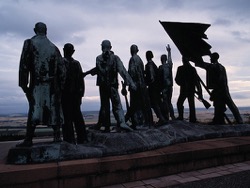2016 should be the year of triumph in Brazil. First on the Latin American continent, the Olympic games, the right to hold which won the Rio de Janeiro, was intended to demonstrate to the world the economic and social progress of the country, its transformation into a stable democracy and one of the most dynamic world leaders. “The Olympic games, as well as the world Cup was conceived as the apotheosis of the eternal country of the future, which finally reached a magnificent present,” wrote in August 2016, the Spanish newspaper “El Pais”. But at the opening ceremony of the Olympic games on 5 August was not the ex-President of Brazil Luiz Ignacio Lula da Silva, achieved in 2009 the games in Rio. The day before he was formally charged with obstruction of justice and attempts to buy the silence of one of accused on the case of corruption in the state oil company Petrobras. Was not at the ceremony and the successor of Lula as President — Dilma Rousseff. 13 may 2016, she was suspended in connection with the impeachment process. The Olympic games were opened by the acting President of Brazil Vice-President Michel Temer. His speech lasted only ten seconds and was muffled by the whistle of the public gathered at the maracanã stadium. Immediately after the Olympic games the impeachment procedure was completed: August 31, the Senate of the Brazilian Parliament 61 votes against 20 issued a decision on the final discharge of Dilma Rousseff from office. Three hours later, Michel Temer was sworn in as the new President of the country. Instead of the expected apotheosis of 2016 was the year of severe economic recession and the deepest political crisis. The drop in gross domestic product in 2015 amounted to 3.1 percent. In 2016, Brazil’s GDP is forecast to shrink by 3.5 percent. The inflation rate is approaching 10% and unemployment exceeds 11%, for Brazil quite a lot. But most importantly, of course, it is a political crisis, to the ground shook the institutions of Brazilian democracy and led to the removal from office of elected President just 15 months after her inauguration for a second term January 1, 2015, the Brazilian transition to democracy, This crisis is particularly revealing, because in the last 30 years the process of creating and strengthening democratic institutions in Brazil, acquiring a public character and, as it seemed, of their separation from the private interests of the ruling and dominant groups, was the generally accepted success story in Latin America and beyond. Institutional reform of the state and Economics undertaken in the 1990s by the government of Fernando Henrique Cardoso laid the Foundation for economic success and social transformation of the country in the next decade. Moreover, the search for consensus, the strengthening of democratic institutions in the 1990s has gradually transformed them into effective channels of political representation in which one can really defend the social interests of various social groups, including the lowest, the poorest of the poor. A visible expression of this was the peaceful transfer of power to the center-left Lula’s government, which in October 2002, on the fourth attempt he won the presidential election. For the country, which throughout the twentieth century the main means of dealing with the left was a military coup, this meant an epochal shift. The first time the native of working class people of left-wing political beliefs came to power in the largest country in Latin America. The election of Lula and the peaceful transfer of power testified to the strength of the Brazilian democratic system and the Brazilian gave the left a chance to realize their ideas in practice. The two-term presidency of Lula, from 2003 to 2010 is not only the undisputed history of socio-economic success, but also the time of the highest rise of Brazil as a country and society that has been achieved over 30 years of democratic development. At the heart of this success lay in the first place, active social and redistributive policies of the government: raising the minimum wage formalizing informal employment, the expansion of Bank credit to those lower-income segments of the population for which it was previously unavailable. The most important and the most famous of these measures was the famous program “Family grant” (Bolsa Familia), according to which families with an income below a certain minimum is paid a small monthly allowance on the condition that children regularly attend school and receive vaccinations against the most common infectious diseases. The result of all these measures of the government of Lula has been a significant reduction of inequality in income distribution in a country that has for decades been the champion of the continent on this indicator. Even more obviously decreased in Brazil poverty: over 30 million people have been able for decades to get out of poverty. In Brazil, a new “middle class” called the class “C”, which, according to official statistics, approximately 50% of the population. We are talking about tens of millions of people who came out of the shadow economy of survival, which for the first time, appeared a Bank card, a legal salary, the first time they began to work under the written contract. This social shift has also brought tangible economic benefits: increased purchasing power and consumption of the lower strata of the population has led to a dramatic expansion of the domestic market, has become one of the most important factors of economic growth in the past decade. Favorable situation on the world market in the 2000s, the high prices of almost all products of the Brazilian export soybeans, meat, poultry, wheat, sugar, coffee has allowed Lula’s government to effectively implement such a redistribution, and so substantially reduce poverty without affecting the incomes of the richest and the overall interests of the ruling and dominant groups in Brazil. At the turn of the 2000s — 2010s, it seemed that successfully solved or at least solved the Central problem of social development of Brazil — polarizing effects of economic growth on society. Throughout the previous history of the country the majority of the population was deprived of access to the fruits of this growth, which in turn transformed the political institutions in the apical, does not reflect the vital interests of the majority and therefore extremely unstable. It turned out that it is possible to successfully combine previously incompatible: liberal based economic policies, viable democratic institutions, redistribution and radical rise in the standard of living of the poorest half of the population. Moreover, creating channels of political representation for the majority and making them an effective means of defending the interests of the majority, Lula’s government has simultaneously strengthened democratic institutions. Emerged, seemed to be self-sustaining “circle of grace” as opposed to “vicious circle”. Especially obvious positive interaction between economic, social and political transformation in Brazil was in the background of what is happening in neighboring Venezuela. There’s redistributive policies have become a means of strengthening the authoritarian-populist regime of personalistic power, consistently destroying the economy and democratic institutions. The crisis and the recession However, as the deterioration in the external economic environment after the crisis of 2008-2009 the price of Brazilian exports are falling, ends the era of “fat cows” and the opportunity to pursue an active policy of redistribution, not affecting anybody’s interests, is dramatically reduced. Center-left government increasingly relies on the poorest of the poor, the middle layers begin from it to gradually move away. By the end of the 2000s, aside from the obvious split of the electorate on the “poor” and “rich.” The inertia of success achieved in the 2000s, allowed the workers ‘ Party again to win the presidential elections of 2010 and 2014 And the 2014 elections Dilma Rousseff won with enormous effort and with the minimum advantage: in the second round voted for 51.6% of voters vs 48.4% at the candidate from the opposition, Aecio Nevisa. This victory was a Pyrrhic one for Dilma Rousseff and the workers Party in General. The preservation of the one party in power for 13 years — three and a half presidential terms in a row — led to its profound institutional exhaustion, the loss of its own ideological perspectives and “ingrowth” in traditional power relations, in which almost eroded their own socio-political project of the party. Meanwhile, in June 2013, on the eve of the Brazil confederations Cup and a year before the football world Cup 2014, the streets of the largest cities in the country come first dozens, and then hundreds of thousands of people protesting against public spending on the construction of football stadiums and sports infrastructure. They need to direct these funds to improve the education, health, urban infrastructure. Among the demonstrators were a large number of those who in the previous decade were the main beneficiaries of social policy of the workers ‘ Party. In fact, these performances was a major evidence of the success of the workers ‘ Party: the population has turned into citizens who wanted to be protagonists, protagonists of their own story. In a country where football has always been the most important national symbol — and the “opium of the people”, citizens openly chose football dignity and well-being! One thing this showed how the country has changed. But the party spent the time for more than 10 years in power, failed to understand and went through huge developments in society. “The party street, lost street, deciding that she no longer needed. (“El Pais”, 17.03.2015) on the Contrary, it has become mostly the party of those who depend on the state and not capable of independent political organization and expression. The scandal with the “wash” against this background, in between the protests of 2013 and the presidential elections of 2014 in Brazil was a scandal that dealt a heavy blow of the workers ‘ Party and has apparently done, at least in the medium term, with center-left political course. This scandal grew out of the enormous success, a huge good luck to Brazil in the end of the second term of Lula, it was announced that on the Atlantic continental shelf of the country found vast reserves of oil deep bedding. Lula solemnly declared that the development of these fields will contribute to the development of the Brazilian industry, production equipment, drilling technology, development of port and transport infrastructure. All this was supposed to be exclusively Brazilian, developed and manufactured in Brazil, to oil production has not led, as in other countries, the “resource curse”, but rather, would give a boost to economy and society. This shining prospects for increased corruption scandal “Lava Jato” (“car wash”), to the ground shook the economy, society and political system in Brazil. In order to enter into a contract with the state oil company Petrobras, almost without exception, the largest construction and infrastructure firms paid bribes to government officials, deputies, senators, governors of States. In corrupt practices were involved not only representatives of the ruling party and its political allies in Congress, but part of the opposition. Just in case arrested 139 entrepreneurs who are in detention under investigation. The total amount of bribes is estimated at a record 10 billion or $ 2.8 billion. The total number of people indicted is 179 persons, 47 of them are political personalities, including the former Chairman of the chamber of deputies Eduardo Kunu and current Chairman of the Senate Ranana Calarosa. The scandal began at the end of the first term, Dilma, before the presidential elections of 2014 and completely paralysed the government in 2015 In the first months of 2016, the country experienced the worst since the 1930s economic recession. The ruling coalition disintegrated, as the main ally of the workers ‘ Party, the Party of the Brazilian democratic movement, joined the opposition. Against this background, there has been a sharp change in the nature of the protest movement: in 2015-2016, hundreds of thousands of people took to the streets of Brazilian cities, demanding the resignation of Dilma Rousseff, speaking against its socio-economic policy and the entire political course of the workers ‘ Party. “Down with Dilma!” was the main slogan of these demonstrations. In this situation it weakened the government, the President has lost public trust and most of the allies, the opposition heads for the impeachment of Dilma Rousseff. What exactly accuse Dilma Rousseff? What was removed from the post of President, for which elections voted 54.5 million Brazilians? The first violation is to increase the state budget without the approval of Congress. In 2015, the government by its decree approved an additional credit to reduce the state budget deficit. The law of impeachment provides for liability for violation of the budget law and the legal use of public funds. The budget is approved by Congress, therefore, is a formal violation of the President is subject to removal from office. The government argued that this was not an increase in budget expenditures, but only a redistribution of funds within budget. The second violation is that the government has delayed the payment of about one billion dollars to the Central Bank under the program of agrarian credit. The Bank provided farmers with a loan from its own resources, and the government a month later returned the money in the Bank. This is considered as low manipulation as getting government illegal loan from a state Bank. The revenge of traditionalists in other words, the President is removed from office for minimum technical violations. To show Dilma Rousseff nothing as against her has not been charged in corruption, it is personally not involved in the case Petrobras. At the same time, against 300 of 367 deputies who voted for her dismissal, brought a lawsuit or criminal case, including in the case of Petrobras. Against 60% of the senators who voted for impeachment, there are also accusations of involvement in the case. In fact, impeachment has become a social revenge of the forces who represent the traditional ruling groups and ruling Brazil, and that four times in a row are unable to achieve the removal of the workers ‘ Party from power in democratic elections. Thus, the historic attempt by the center-left forces to translate the social contradictions in the institutional channel, unfortunately, failed. The desire to solve social problems in a country with extreme income polarization, institutional methods have proved to be largely an illusion. I must admit that the system broke down and returned to its traditional state. It is obvious even on a symbolic level: the new government of Brazil is composed of white, wealthy and very elderly men, there is not one woman, not one of any dark-skinned person. Undoubted and responsibility of the workers ‘ Party in Brazil befell institutional failure. Obviously, she didn’t need to cling to power, didn’t need to win the presidential election, 2014 to the democratic institutions serves as an effective channel of defending different social interests, the government needs to change. Democratic institutions are institutions are instrumental, they work well only when the different political forces, different parties in power alternate, not perpetuate its dominance. Tatiana Vorozheykina
Check Also
NHS in England facing ‘storm of pressure’ as flu and Covid cases surge
Average of 3,631 patients in hospital with Covid during Christmas week, data shows, a rise …







